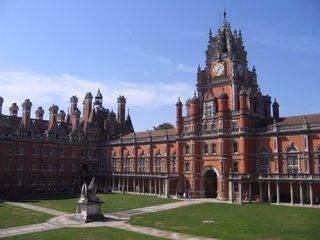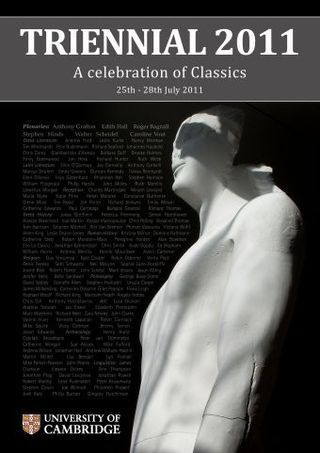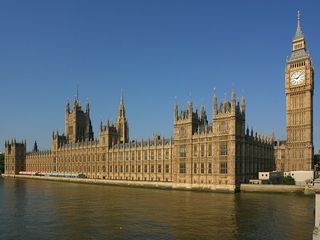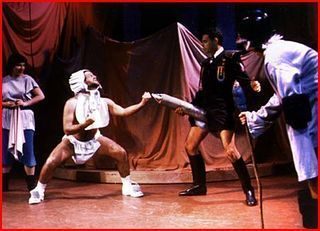Mary Beard's Blog, page 65
June 30, 2011
Royal Holloway: update

I am told -- second hand, but I think accurately -- that the Principal of Royal Holloway has now communicated with all his staff; and it rather confirms my suspicions about what is driving all this.
Professor Layzell is concerned, he says in his letter, about the "academic portfolio" of Royal Holloway.. PORTFOLIO? like a set of investments? Indeed, he actually says he wants 'to invest in Royal Holloway's core strengths'; 'we are proposing,' he explains, 'a finely judged reconfiguration of our academic portfolio.' (This is a University, remember.. but nothing so far except about the uni's business model.)
He insists that the staff affected by this 'finely judged reconfiguration' were briefed ahead of Wednesday's meeting (well they were briefed on the Monday before a meeting that took place just two days later.. what kind of empowerment was that?). And he now puts all his eggs into the basket of 'internal consultation', saying that there will be no public statement until October (by which time it is presumably to be all agreed).
For Classics and Philosophy, the reasons for the reconfiguration are:
1) slipping student satisfaction scores (I wonder if students realise that sounding off in a questionnaire, which is what students are SUPPOSED to do, could result in the whole department being shut down... ironically it is some Classics courses devised by the Royal Holloway department that AC Grayling has borrowed for his New College, so someone thinks they are good! );
2) a lower than average research performance (it is true that the department did not do brilliantly in the last RAE, but just look at what is coming out of this department now...anyway, one thing is for sure: all the time these guys are going to be spending fighting for their survival will take their minds and energies off their research);
3) a substantial departmental deficit (here we see the danger of various Resource Allocation Models. You can easily make any department look as if it is making a profit or a loss, depending on how you decide to construct the figures. At one stage in Cambridge it looked as if the Facuty of Classics was going to be 'credited' with a vast deficit because we have so many square metres allocated to a Museum, one we have owned and used, in various forms, since the late 19th century -- but at that stage we were threatened with being 'charged' for every square centimetre we 'occupied'.) To break even, the Holloway Department would need to take twice as many students, and 'the College does not have the numbers to allocate'... and, he claims, isnt sure they could attract them anyway.
So the proposal is to cut all study of Classics in the original language, and invest entirely in History and Classical Studies ('where demand is still strong'...this is a demand economy obviously, not an EDUCATIONAL university). And the remaining 'classicists' will move to History, 'to enable the shared teaching of ancient history, leverage of research leadership and shared administrative support'. ('leverage of research leadership...'? what does that mean -- especially when you are cutting the whole linguistic side of this operation.)
Now, I know that outsiders like me can never really understand what is going on inside another institution. I have no idea what the student questionnaires are like, or the potential research submissions to the next Assessment Exercise. There will be all kinds of things going on that I know nothing off.
All the same, it doesnt take much to smell a commercial argument for academic change here.
Classics at Royal Holloway under threat

Slasher vice-chancellors tend to use the same tactic to get their way. First they announce some departmental massacre... all the jobs in the Sociology Department are to go; there will be two positions in the History Department that the 30 Sociologists can compete for, the others will be made redundant . . . oh, and also there is to be no consultation, it is going to the University Council tomorrow.
Panic all round, of course, and screams of anguish. When it actually comes to the Council, the proposals are watered down. The Sociology Department will be merged with the Department of History; there will be a designated "Sociology pathway" in the new History degree; compulsory redundancies will be avoided if at all possible, thanks to an early retirement scheme, which will bring down the total of Sociologists from 30 to 15 . . . The poor bloody Sociologists breathe a sigh of relief (understandably, they are not going to be competing with friends and colleagues for a couple of posts, or alternatively on the scrap heap), and there is guarded celebration that the Council saw sense.
Of course, the truth is the VC got what he wanted in the easiest and quickest way imaginable. The Sociology Department has been emasculated, 15 of them will go (and oh dear, there did in the end have to be just three compulsory redundancies), no good students are attracted to a Sociology course that is only a pathway in a History department, and every time a sociologist retires he or she is replaced by a historian....They have in fact been closed down -- but all they can think is that it could have been worse.
Something like this has been going on in the Classics Department at Royal Holloway in the past few days. Last Friday, the Department was summoned to an urgent meeting this Monday, to tell them that the philosophers amongst them would be moved to politics, the remaining 12 could fight it out for 5 jobs in History (where there would be a Classics 'footprint'... one down from a 'pathway'). The rest would be offered counselling in "managing change' (just how patronising is that?). There was to be no consultation, and the matter would be decided by the Council on Wednesday, just two days after the Department had heard about the proposal. (I am sure that the Principal -- a software engineer -- would call this 'strong and decisive leadership'; I call it dictatorship and obstinacy.)
On Wednesday, the decision is not quite so bad as was feared.
There is to be a new Department called "Classics and History", and there will be 40 places for people to read Ancient History and Classical Studies. The idea would be to avoid compulsory redundancy with an early retirement scheme.
Well I am hugely relieved for the people whose jobs were on the line. But dont cheer too soon; this looks to me like the slow death, rather than the quick death, model. There will be no language teaching, which -- in my view -- always take the stuffing out of any classical enterprise. What keen classics student would opt for this? And bet you anything, as soon as one of those classicists in history leaves or retires, they will be replaced by some one in British 19th century, or South East Asian post-colonial.
So please, make a fuss about this ... and write to the Principal saying what an error it was.
But why is it an error?
Lets get real. There is no reason to imagine that universities should never change, and there is no reason to argue that when thousands of people in the public sector are losing their jobs, academics should be -- as of right -- immune.
But Royal Holloway is a good Classics department; and it you excise it from Royal Holloway, you impoverish and devalue all the humanities there (there was a threat to Italian too, I wonder what happened to that). If you want an example of what happens to 'standards' if you think you can just do without Classics, try this. In fact one of the themes of my Mellon lectures was that you cant do the cultural history of the West WITHOUT Classics -- or if you do, you make some ghastly errors (embarrassing details can be provided on request).
It is hard not to thnk that this Principal is not doing a crafty bit of financial speculation in advance of the £9000 fee regime. When that starts, so his argument probably went, the kids wont want to cough up for "useless' subjects, like Classics, they will all want career orientated things, like.... software engineering. And that of course is exactly how the humanities will get hammered by the Coalition's policies. The government will be able to pour their blessings on the humanities, while VSs across the land will do their dirty work for them.
When Margaret Thatcher abolished university tenure in the old sense (it used to protect academics from redundancy), it was in the interests of flexibility and change (how were universities supposed to run themselves responsibly if they could never decide to stop teaching something and move in a different direction? -- as Thatcher and co. ridiculed the gold-plated protection that academic seemed to enjoy). OK, there is something to be said for change. But the old system had much to be said for it too. It certainly prevented subjects being simply at the mercy of management will and whim.
If, before you write to the Principal, you want a flavour of the management style at Royal Holloway, try this litte taster from their website.
June 28, 2011
Classical Question Times

Bit of an advert here. But we are having two big public classical events in Cambridge in July. One is about the Death of Socrates, the other is about the Future of Pompeii. Dates are 26th and 27th July. Everyone welcome.
OK, the background? There is a big classical conference ('the triennial') that happens every three years in Cambridge/Oxford. It has always been quite hard core. But this year we decided to open the thing up a bit: to keep the hard core but to add on some intelligent, public fora... to talk about how Classics matters still. For everyone from 11 to 99..
The two panels feature classicists (Cartledge, Hobbs, Wallace Hadrill and me) and those with a relevant interest.. from Shami Chakrabati to Simon Jenkins and David Cannadine, Caroline Lawrence to Simon Heffer and Roger Scruton.
The format of the two events is basically the same...some panel presentations, interaction, debate and argument followed by questions and contributions from the floor. The idea is to get us all arguing about Socrates and Pompeii.. about why we think these are important, and whether it matters more widely (does Pompeii have something to tell us about Stonehenge? did Socrates deserve all he got..and does it matter anyway? )
It's a fantastic line up..I've never heard Shami C reflect on Socrates before, or Simon J take on Pompeii. And there will be book signings (NB Flavia Gemina fans..)
So I really hope you will come (else I will look dead stupid sayimg that Classics still pulls in an audience..so back me up please). There is a fee per ticket (£10), with concessions.. but we are not profit making .. we are just covering the hefty cost of the venue, travel, overheads etc. Details: here.
Please come along, come and speak up and show the world that we can fill the Lady Mitchell Hall (600 or so) for a classcal event.
Indeed come to the whole conference.
June 25, 2011
Exam speak

I have just finished marking exams (Part Ib of the Classical Tripos). That means something like 130 scripts in all. Leaving aside what the candidates will get in the final results table (and that's not decided till next week), I have two immediate reactions.
First, the handwriting. There is something very odd about exams in the 21st century because the kids dont usually, through the academic year, handwrite anything. The good side of this is that you dont recognise the author of any script at all (in the old days you had marked so many essays in handwriting that you knew exactly whose script you were marking even if it was formally anonymous). The bad side is that they are so unused to writing anything by hand that a lot of it borders on the illegible.
Happily the dyslexics are allowed to types their answers , and I found myself longing for the next dyslexic . . . or for the day when they were all allowed to type their answers.
By and large, dyslexics apart, this is how it goes. One script in 20, you have 30 sides of crabbed, blotty handwriting. You can just about decipher it.. but that probably takes about 5 minutes a side. At a certain point you get so cross that you are tempted to give up. 'Illegibility will be penalised' it says on the papers. Right on, lets penalise.
So what stops you?
Well in my case, it's partly a family thing (or at least it's put into higher relief that way; the truth is that I have always persevered with this stuff, reluctantly...). My son has truly atrocious handwriting. But in Oxford last year some poor examiners persevered with his scrawl, enough to give him a First. For which effort I am truly, truly grateful. So now when I spend hours on these scripts I can barely read, I think: "I am not doing it for you, you messy child.. I am doing it for your Mum who wants more than anything that someone will go the extra mile to read your scrawl". And so I do.
In fact it can sometimes be very funny prose you end up reading. Exam speak afflicts almost all the candidates, drawing them 'back' to words they have never used ... and indeed not have been used for generations. I cant count the number of "aforementioned"s I have spotted in these scripts (as in "the aformentioned legislation"). Not a single one has been penalised by me. But what on earth pushed the students into this archaic speak (how often have any of them used the word before, I wonder)?
Nerves must be the answer, I guess. But it's a very odd idiolect that results.
June 21, 2011
Dream School goes to the Education Select Committee

Yesterday I went to the House of Commons to give evidence at the Education Select Committee, who had decided to discuss what came out of the Dream School experience, and what lessons miht be learnt. I had been a bit sceptical about this. I mean it was only a reality tv show and -- while it might have prompted some interesting debate about things educational -- it was not a guide to what is, or is not going on, in the nation's schools. Certainly the idea that you can get any clear idea of issues of discipline from what happens when a tv camera is pointed at 20 late teenagers and a group of (fairly media hungry) pretend "teachers" is simply bonkers.
Actually my worries were, by and large, allayed. I had never been to a Select Comittee before, though I had watched them on the television (OK, next question .. what happens to a group of media hungry politicians when you point a tv camera at them?). But I knew that many people thought that (after the House of Lords) they were the best place for finding reasoned and reasonable discussion in our parliamentary process. And so it turned out to be. The discussion took planty of time (2 hours), the MPs had a reasonable knowledge, had done their homework and listened.
So how did it go from our sides? Well first some of the kids were interviewed. They were brilliant.
If you watched all that footage of the fighting and the lippiness and the tears on the Dream School series, then try this for an antidote. (Click here to watch the Committee.) They contributed clearly,  articulately and often movingly -- about what had gone wrong for them at school and what they were hoping to do now. (One is going round talking to primary schools and hoping to move into journalism, one is about to do a childcare/youth work qualification, one is holding three conditional offer for an IT place
articulately and often movingly -- about what had gone wrong for them at school and what they were hoping to do now. (One is going round talking to primary schools and hoping to move into journalism, one is about to do a childcare/youth work qualification, one is holding three conditional offer for an IT place  at Uni, and so on..) It looks like a total transformation, which of course it can't be. They must have been ike this all along underneath. (On the right is a couple of us in the pub after, and in the House of Commons corridor on the left).
at Uni, and so on..) It looks like a total transformation, which of course it can't be. They must have been ike this all along underneath. (On the right is a couple of us in the pub after, and in the House of Commons corridor on the left).
Then it was the turn of some of the teachers: the head, plus me, Alvin Hall, Robert Winston, Jazzie B and David Starkey.
Most of us were singing pretty much from the same hymn sheet, not too full of doom and gloom about the British system, a desire to free teachers up a bit, and no passion for the kind of old fashioned discipline that people our age like to imagine is just what the kids need (and will "work"... whatever that means!). Oh and plenty of praise for Latin! Not so Starkey.
He was the only one of us not to turn up to hear the kids give their evidence. OK he has obviously hurt his foot, which is some excuse. But it would in the circumstance have been wise. For when he opened his mouth to say what a wild undisciplined bunch they were, this was dramatically undercut by what we had just seen of them when they gave their evidence.
By and large, he came out with the old Starkey stuff, interspersed with some silly ad hominem attacks on John D'abbro the head (who Starkey had somehow failed to see was in the same boat as the rest of us in a way, in relation to the tv).
Now Starkey is not stupid, and not everything he says would I disagree with. But his claim that schools which strictly enforce rules on uniform do not have any "discipline problems" cannot possibly be true (for a start, "discipline problems" is not a fixed and objective category . . . I shudder to think what got punished at my school).
Overall Starkey is the victim of the the kind of tunnel vision that affects many of the successful middle aged. Because he is a success, he thinks that the kind of schooling he had was the right one. So it might have been -- for him. But he has decided not to think of the "failures" next to whom he sat, still less of the 80% at the local Secondary Modern. (Grammar School, excellent as I am sure many of them were and are, always are seen from the point of view of those who got there.. not the rejects.) Not that me and my chums are immune from this kind of glowing nostalgia. When we complain that the kids dont sit down and read as much Latin and Greek during their degrees as we used to do, we tend to forget that "we" were always unusual even for Cambridge . . .of course we were, else we wouldn't now be profs there.)
And Starkey could have done his homework better. He lamented that fact that, although he had taken Danielle up to see around Cambridge, and although she was very bright, she still wanted to become a beautician. What a waste, what a lack of ambition, he lamented (and what a failure of the education system).
What he had failed to notice was that Danielle has just landed a big part in East Enders. Some ambition there, I suspect.
(Then for me it was back to Cambridge to say goodbye to the daughter, who is off to South Sudan for more or less a year. Wish her luck, folks.)
June 16, 2011
Now wash your hands

I am in Brussels again, doing the interviews for ERC Starting Grants. Long term followers of this blog will know that I have moved from a degree of uncertainty about this Euro Research Enterprise to being a huge supporter of it. (Thank God for the EU whose reaction the recession is to plough money into research, not take money away from it.)
All the same, a week at Euro HQ does occasionally give you a hilarious glimpse of the nanny state. Like the step by step hand washing instructions in the ladies' loos. The male members of the team claimed not to have spotted these in the mens' loos -- whether because it was assumed that blokes already knew how to wash their hands, or whether (more likely) they were believed to be past teaching . . .
In fact I have never quite seen the point of those UK loo notices "now wash your hands". Are there really people who were going to give the hand washing a miss... until they see the instructions? In fact, I'm the kind of counter-suggestible type who is actually less likely to wash my hands when confronted with this kind of finger wagging.
But "Now wash your hands" is as nothing when compared what you find in the Brussels Euro loos.
This kind of stuff make me want to shove my hands down the pan. Is there really anyone who turns the tap off with the paper towel?
And what of the injunction not to touch your face with your hands during the day (on the bottom of the  full version on the right). Why not just get us all kitted out in a germ free suit?
full version on the right). Why not just get us all kitted out in a germ free suit?
Is there really a lower rate of sickness at Euro HQ, thanks to all these notices?
But it's a small blot on an otherwise shining landscape. Thank you Frank and Volker for making our stay so productive (if all young Eurocrats are this good, then Europe is in safe hands). And thank you all fellow panel members. It's a picture of our final dinner below (with Jane Burbank and Carlo Ginzburg and Michael Werner in view).
I think there might have been some face-touching. But never mind.
June 13, 2011
How to teach pregnant women not to drink
"Concerned health professionals" (as we have started to call them..doctors and nurses to you and me) have been wondering about just how sensible it is for the Health Service to accept cash from an alcohol company (Diageo) to train midwives to train pregnant women not to hit the bottle. Diageo are apparently coming up with something close to £1,000,000 to teach 10,000 midwives to explain to their 'mums' about the dangers of mixing alcohol and gestation.
It was hard not to symathise with the doctors and nurses. That is to say, it was hard not to come to the conclusion that (however sincere Diageo might be about getting these women to be abstemious for 9 months) it was actually in their commercial interest to encourage them to go back to it afterwards. ("You should quit until it's born, my dear, but after that you'll really need to drown your sorrows in a gin and tonic... that's the only way you can survive with a young baby....take my advice.."). How does that figure with objective health advice?
But my objections to this were rather different. Why on earth do you need a million quid to teach midwives to discourage alcohol consumption?
I mean, they are sensible, professional and often very experienced people. The idea that too much alcohol isnt a good idea in pregnancy isnt exactly new. (When I was pregnant 30 years ago, the propoganda against booze was at its most Stalinist . . . I was so terrified about the alcohol I had consumed before I realised that I was pregnant, that my sensible GP had to reassure me that (in Cambridge at least) the conception of most babies was alcohol assisted, and that anyway the best correlate with a baby's health was parental income, not consumption of anything).
So maybe Diageo could just provide these 10,000 midwives with a sheet of A4 updating them on recent research -- and leave them to get on with it. And then spend the rest of the million pounds on something more useful.
June 9, 2011
Empty nest vs full nest

Our children have long since left home. That means we welcome them back with immense pleasure at Christmas and at other times when they zoom through; otherwise we use their rooms for visitors and a place to do the ironing (me) or hang out the shirts (him).
But for the next two weeks the nest will be unusually full again.
The daughter is stopping off in Cambridge, for a bit, before going to South Sudan for a year for her PhD research (starting with a crash course in Dinka in Juba....she has been learning as much as she can in the UK with some great teachers in North London, but if you want an organised course, then it's in Juba).
The son is coming back from Cairo tomorrow, where he has been doing Arabic for a year -- hopefully going to the US next year. His course in Egyot ended a few weeks ago and, since then, he has been doing photos for friends and translation for this website (and some great translation from Horace to English if anyone is interested). He is well open to offers, I should say, for any Arabic/English work this summer...
But what about the full nest?
Well -- it's actually wonderful. If you ask me the best bit of parenting is when you have grown up kids who beam down and tell you when you are being stupid/ ridiculously self-effacing/ priggishly martyring... It beats GCSE revision any day, or even those memorable Easter egg hunts (but thank you Sue for those.. I dont think any could have been more memorable).
All the same, there is still a bit of a generational conflict. Mostly about the washing up -- and I should say a long inherited one. When I was in my late teens/ early 20s I often used to fetch up at my mother's place and work there. The day was a succession of books of Virgil and cups of coffee, and the dead cups ended up in various nooks and crannies all over the house ..and all ready to be washed up. She would come home, I vividly recall, and moan very tediously about the mess.
Why, I could never understand. I was seriously intending to wash them up; and did it really matter exactly when...?
Aged 20 I could never quite understand why she got so pissed off.
Aged 50 + I find that I want to berate my own kids for the bloody mess... and for the sheer irritation of it, even if you know that they will clear it up LATER. Somehow when you're 50+ "later" is never quite good enough.. and you scurry around in martyr-mode...
But .. actually I am SO pleased to have them back for a bit, that I will forgive almost anything. ALMOST.
Meanwhile I reflect on all the ways I vowed that I would never be like my Mum, and now (of course) am. Coffee cups apart, the other big one is the capacious handbag in which I, like she, rattle around trying to find the fiver to pay the cab driver...My kids (and indeed husband) shrink with embarrassment at this perfoemance. Like mother, like daughter. Oh dear.
June 5, 2011
Is Grayling's New College a New Oxbridge?

I have only just discovered that A C Grayling has plans to launch a new private university. I have to confess to some sympathy with this: if there is to be a sustained assault on the humanities, then maybe someone has to get off their ass and take the teaching into their own hands; and if there are to be more and more central demands from central government (many of them tick-box, but still hugely time-consuming), then maybe one simply has to set up a new show outside of all that silliness.
But it's when I see this New College headlined as a "New Oxbridge" that I reach for my gun (that might be hacks' fault, of course, not A C Grayling's).
What this looks like is a US style liberal arts college, which can be a very good thing, but is a very different animal indeed from Oxbridge.
So what's the difference between New College and Oxbridge (and almost every other top -rank UK university for that matter).
First: it will offer no science degrees (there will be some science teaching as a background course). One of the best characteristics of a place like Cambridge is that it teaches sciences alongside arts and humanities -- which both fields benefit from (their staff and students, in college and common room). The university, in other words, is (and should be) an active and pro-active bulwark against the division of the Two Cultures. It is good for physicists to have classicists around, and vice versa.
Second: so far as I can see, the New College will be for undergraduates only (like most US liberal arts' colleges). No Masters or doctoral students.
One of the crucial things about Oxbridge etc is that they teach and employ people at every stage of their academic careers, from undergraduates through graduates, and post-docs, lectureers to professors. And indeed the fostering of the next generation of academics, and the constructive intellectual relationships between undergraduates and those the next stage up on the academic ladder, are an important part of what a really good university is about (the Harvard model, rather than the liberal arts model). In fact there is something a bit parasitic about the New College plans (much in the way that a private hospital is parasitic on the NHS). Teaching smart young undergraduate students is only one part of the job; it's also about training the next generation of teachers who will teach the next generation of undergraduates (like training the next generation of doctors and nurses).
As for other aspects of the plans, it's too early to tell yet about the financial base and the fee support that will be available to those who cant find £18,000 a year for the fees (so far there are plans for financial assistance to only 20% of the intake). But there must already be some question over the star studded list of profs who are blazoned through the reports this morning. Let me be honest, some of them I count as my friends -- and I hope they stay that way. But I really dont imagine that those with full time jobs in the USA will be giving those jobs up; they will make it to New College at most for a few weeks a year. And a good number of the others are well into retirement (including one who is almost 80). Sure, we don't always make the most productive use of academics in their 70s (when good scholars can sometimes be producing their best work), but again it is a different ballgame from appointing people to an academic career.
We shall have to wait to see what Grayling and co. do about the younger staff. But meanwhile can I say that if anyone comes to Newnham College Cambridge to read Classics, I shall be teaching them (except for occasional terms of research leave) throughout their three or four years as an undergraduate... in small groups, sometimes one-to-one, in college, round the kitchen table, off in Paris...
My final doubt though is whether it is too soon for these guys to be jacking in the mainstream university system. Directing their considerable energies to the new independent enterprise will mean that they have much less energy to direct to what is happening across the state funded (or 'unfunded') humanities in general. I find myself comparing them to the old SDP. One can understand why the "Gang of Three" left the old Labour Party. But in retrospect it might have been better if they had stayed in and fought. In fact, ironically, they might have kept it a good deal more left-wing than it has become.
June 4, 2011
Young minds . . . and the dirty bits (in Aristophanes)

I am pretty much in agreement with the Mumsnet line that there is something truly ghastly about young kids and aggressively sexualised clothing... what on earth goes on inside the mind of someone who designs a padded bikini for a six year old or a pink T-shirt (size 18 months) with "Come up and see me sometime" blazoned across the front I really can't imagine.
But the David Cameron view, as reported on the radio and in the Guardian this morning, prequelling Reg Bailey's recommendations, that it should be BANNED (along with a whole raft of other things that are "inappropriate" for kids) is quite another matter. For one thing, how on earth is it going to work? It's all very well being strict on enforcing the 9 o-clock watershed, but when any self respecting 5 year old can use iPlayer on his/her computer, what exactly is the point. (And the rules for post watershed are pretty odd anyway. Our Pompeii documentary was a post-watershed programme -- and what young minds would that have corrupted?)
And just think of all those law suits and legal fees that will follow the disputes about whether this or that logo is too "sexualised" ... (the point about languages, as Frankie Howerd and Kenneth Williams showed us, is that it is posible to sexualise almost any phrase if you try hard enough.)
But anyway isn't the effect of a ban (or a brown paper bag around a lad's magazine) to make it more intriguing to the curious child, not less?
That's how it worked when I was 13 or so for the dirty bits in Aristophanes. (A photo of a recent production of Lysistrata is at the top of this post.. just to remind you of the bawdiness.)
Ok it took me about a year or so of reading this particular Greek comic poet at school to realise that the reason the line numbers apparently went from 1205 to 1210 in only 3 lines of verse was NOT to do with problematic and corrupt textual transmission -- but because some Victorian nanny-state editor had taken out a possibly corruptING couple of lines that were something to do with sex (or occasionally bottoms).
Their expurgation served to make them much more alluring. So, as soon as we got a chance, and we were up at the boys school, where they had a much bigger classical library (thanks to Dr Kennedy among others), we rushed to the unexpurgated version in some complete, not-for-kids, text and pored over it with the boys in a kind of academic version of "doctors and nurses". It was, of course, extremely good for our Greek...but that hadnt been the object of the expurgatory exercise.
Of course, you will object, sexualised clothing and sexualised images near schools are not the same thing as the naughty bits in an ancient Greek dramatist. In some ways they are not -- and in some ways they are. Both of them, in their different ways, are a nice illustration of the "BAN IT" culture that we have come to accept. If you dont like something, if you think -- even more --that its presence could harm young minds and bodies, then BAN IT -- as if that was effective, and the only strategy of change that there was. Surely, if we disapprove of such things, we are clever enough to devise other ways to discourage them (as at last that sensible report on drug use and abuse suggested this week).
Not every culture behaves in quite this way. When our children were young we often used to spend a week in the summer in a Greek village where there was a nice open air cinema, usually showing English/US films with Greek subtitles. There was no apparent interest in any form of 'classification', but many of them had '18' certificates over here. The under 10s in the village tended to sit on the front row, enjoying their Coke and icecreams, while some often up-front images of coupling and breasts and bums passed on the screen in front of them (accompanied by a dialogue they couldnt understand and subtitles many of them could not read). Maybe untold damage was being done to them. Who knows? But that was not the impression we got. In fact most of the younger ones were throughout much more interested in the icecream than the screen (on the principle that you have to begin to understand what is going on before you can be interested in it).
Greece isn't exactly a role model in modern Europe at the moment. But this may be something it has got right.
Mary Beard's Blog
- Mary Beard's profile
- 4110 followers






